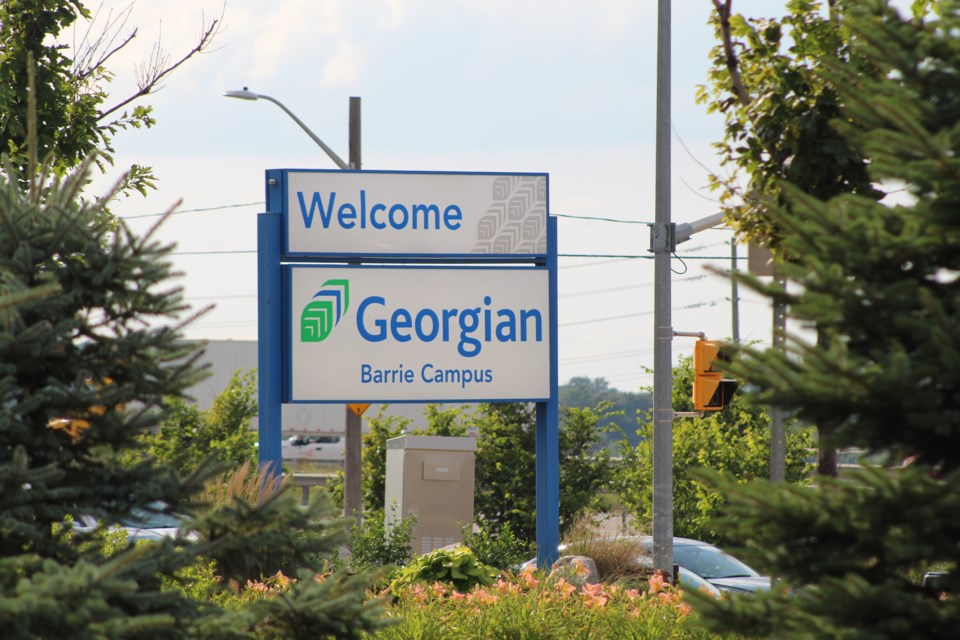Attracting more international students plus growth in areas such as research and innovation have been the focus for Georgian College in recent years.
College president and CEO Dr. MaryLynn West-Moynes made a presentation this week at Barrie city council, highlighting the status of many aspects of life at Georgian, which has 13,000 full-time students with an average age of 22 years old.
"With Grade 12 enrolment in Ontario decreasing more than 15 per cent over the past six years, Simcoe is declining more rapidly," she said. "We manage that decline by focusing our efforts on increasing international enrolment."
A half-decade ago, the college had around 300 international students. Today, there are 3,600 international students from 85 countries.
However, West-Moynes noted that elementary school enrolment is up in Simcoe County, which bodes well for the college.
"They're on track to be coming to college in about 10 years," she said. "That's when the curb is about to turn."
Mayor Jeff Lehman said the decline in numbers was driven by demographics and a lack of land for residential developments in recent years, which led to not many elementary schools opening.
"Of course, that's going to change as the annexed lands (in the south end) come on stream and the demographics change, too," he said.
West-Moynes noted the college has been able to rebound from a 1,000-student decline in enrolment in 2010 to now having more than 1,000 students than they had before the dip.
"Good, steady growth is probably the way to go," she said. "We've got the right infrastructure, we've got the right programs and we've got the right support and jobs in our community for us to be successful."
For every tax dollar invested in Georgian, West-Moynes said there's a $15 return to the community.
The college operates out of seven locations, including the main campus on Georgian Drive, as well as the Arch and Helen Brown Design and Digital Arts Centre, which opened in downtown Barrie in September 2017.
"It's like a living lab to be down here in the community and we've had nothing but positive feedback," said West-Moynes.
Georgian also has locations in Collingwood, Orillia, Midland, Bracebridge, Orangeville and Owen Sound, as well as three Centres for Career and Employment Community Services and four Indigenous Resource Centres.
Coun. Clare Riepma asked how the college plans to manage future enrolment.
"Our job is to provide talent to employers not only in our community, but in Ontario," West-Moynes said. "We know that there's going to be 100,000 less apprentices than are needed in the next five years, so that's our No. 1 issue.
"The challenge for us ... is getting our community to make sure they hire our internationally trained students here in our community and not let them migrate south to Toronto," she added. "If we aren't creative enough, we'll have shortages. It really is following that supply and demand of what employers actually need, and that's what drives the programs that we have."
The college has more than 130 programs, from certificates to four-year degrees.
"We like to think we have something to suit anyone, no matter what their interest or passion is," West-Moynes said. "We have six of our own degrees, and I'm proud to say we've just had two more added to start in 2020, in counselling and health management areas for our communities."
While discussing degrees offered through Georgian, West-Moynes also spoke about possibly bringing a "nursing partnership" to the Barrie campus through York University, which she called "a high priority for us in this community."
"The province has told us we can have 10 degrees, so we're at eight," she said.
"We are under-performing in degree enrolment in Simcoe County, but it is changing," West-Moynes added. "And it's changing not only because of our work, but Lakehead has grown in Orillia as well, but we're going to try and be strategic and efficient in the types of programs that we offer so we're not competing with each other."
Georgian is the largest co-op college in the province, she said, working alongside 6,200 employers.
West-Moynes said the college's participation in research and innovation has also been expanding rapidly.
"Last year, 76 industry partners worked with 34 faculty researchers and 246 students on 114 research projects, up from four just six years ago," she said. "We've seen some dramatic growth in that particular area."
That includes everything from generating ideas and concept testing to prototypes and marketing research.
"This can actually start driving more business to our communities and, at the end of the day, that's what it's all about," she said.
Lehman said he was pleased to the college's heavy involvement in research and development, because it can only help local economic growth. He called the increase in the number of projects "a remarkable transformation."
A lot of that work is done in the Peter B. Moore Advanced Technology Centre, which opened at the Barrie campus in November 2018.
Coun. Barry Ward asked how many graduates stay in the community, but West-Moynes said she did not have that information, although it is data the college is starting to track.
About 57 per cent of the college's alumni live in Simcoe County, West-Moynes said, adding the federal government has "relaxed" some the requirements for international students specifically to allow them to enter the Canadian workforce.
"Everybody I've talked to, that's their goal: to get an education and they would like to find a job and stay in Canada," she said. "We need them."
West-Moynes also touched on the city's recent adoption of a U-Pass transit program for college students.
Lehman noted transit numbers "are through the roof," which he credits to the U-Pass program.
West-Moynes said the U-Pass has made it possible to lessen the concentration of college students in the city's east end.
"We've moving our students all over the city, instead of just having them in one area," West-Moynes said. "You've solved that for us."
